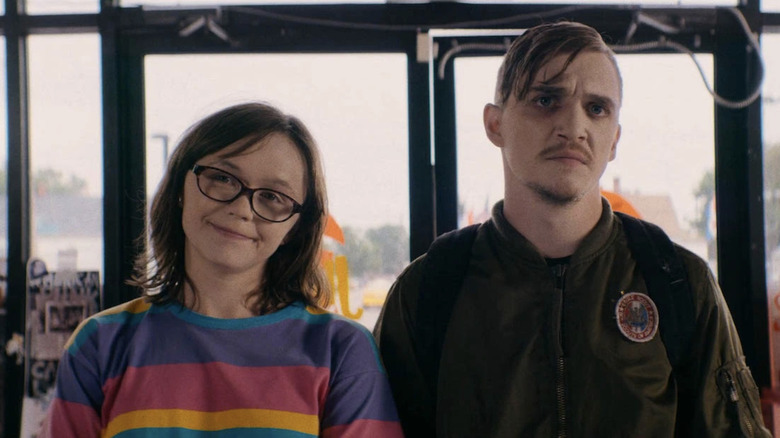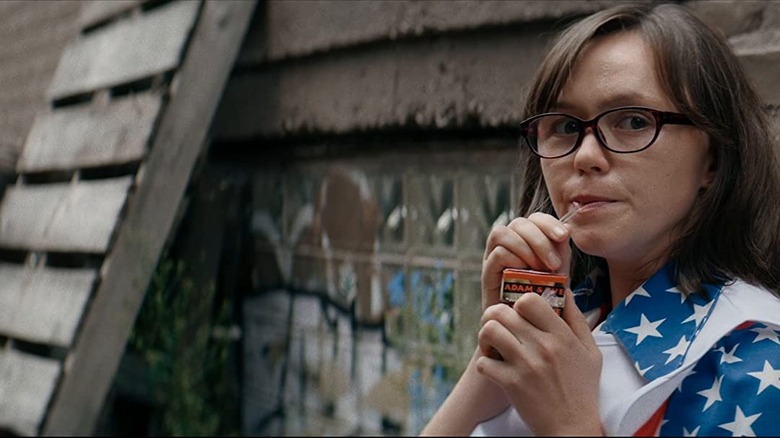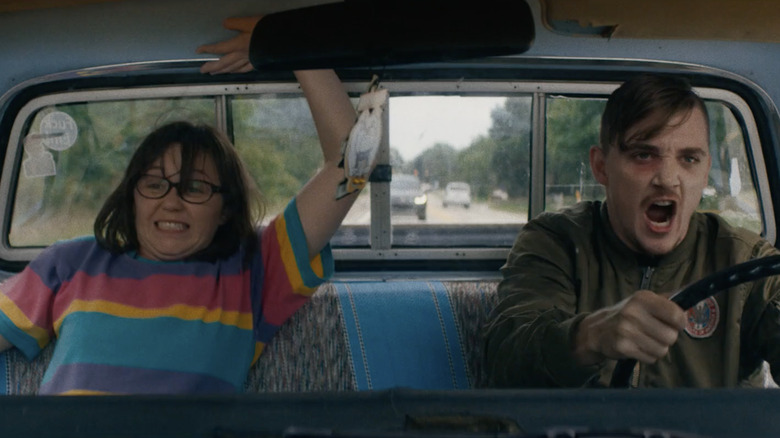The Daily Stream: Kyle Gallner Is Everyone's Midwest Dirtbag Punk Music Boyfriend In Dinner In America
(Welcome to The Daily Stream, an ongoing series in which the /Film team shares what they've been watching, why it's worth checking out, and where you can stream it.)
The Movie: "Dinner in America"
Where You Can Stream It: Hulu
The Pitch: Kyle Gallner has been a utility player in genre films for over 20 years, appearing in films like "The Haunting in Connecticut," "Jennifer's Body," the "A Nightmare on Elm Street" remake, and Kevin Smith's "Red State." He had a small-but-mighty role in the most recent "Scream" film, and is currently spooking up audiences in the smash-hit "Smile." However, it was the 2020 festival darling, "Dinner in America," that gave Gallner the space to turn out a career-best (so far) performance. He stars as a reckless, on-the-lam punk rock singer named Simon with a penchant for pyromania, who takes solace at the family home of an awkward young woman named Patty (Broadway's "Fun Home" star, Emily Skeggs) to avoid being scooped up by the cops. Simon is initially using Patty for a safe house, but as time goes on, the two unexpectedly fall for each other and spark a relationship fit for a rust-belt, punk rock love song. It's a movie that spits in the face of the establishment with rebellion coursing through its veins, but a heart pumping with that once-in-a-lifetime love that can only be matched by hearing that one song that changes your life for the very first time.
Why it's essential viewing
With few exceptions, movies about the punk rock scene are almost exclusively set in coastal cities, despite the fact that the Midwest has always boasted a vibrant music community. "Dinner in America" is set somewhere around Detroit, and showcases the rough and tumble rustbelt suburbs with uncomfortable accuracy. The opening 20 minutes paint a picture of Midwest living that often gets sugarcoated, but "Dinner in America" has no interest in presenting a world that is palatable if it means sacrificing the truth. Jerk jock bullies constantly call Patty the r-word, a horrible white dad calls football players the n-word while watching the game on TV, and even Simon casually uses some gay slurs when trying to get a rise out of Patty by mocking her family's portraits.
These first 20 minutes almost prevented "Dinner in America" from being released in America, because distributors wanted the abrasive language censored. Kyle Gallner talked about the situation with Screen Rant, saying, "Those first 20 minutes are unbelievably intentional. We need to paint this picture of Patty and Simon's reality to show what these people have to go through for the next hour and 15 minutes." Gallner says he believes people are often uncomfortable with the film's worldbuilding because "they don't want to acknowledge that the world exists in this way." As someone who recently moved to Los Angeles after a life in the Midwest (Chicago and Cleveland, represent!) I can say firsthand — he's right. "They want to still believe that racism doesn't happen, or people don't use the R-word to talk about others who are on medication, or whatever," Gallner says.
Speaking from my own experience, non-Midwest folks legitimately think I'm lying when I tell them how normalized open bigotry is because it sounds implausible unless you're living in it. Sorry to break the news, but "Dinner in America" isn't being "shocking" by including these first 20 minutes, it's introducing audiences to a world progressive circles would rather pretend doesn't exist.
The best on-screen team in years
Kyle Gallner delivers an absolute masterclass in charismatic dirtbag behavior, providing the best "Oh, you're so gross and awful but please ruin my life" character since Timothy Olyphant's Todd Gaines in the 1999 crime comedy, "Go." On paper, Simon is an awful boyfriend. He curses out strangers at diners, sets stuff on fire, I don't think he bathes regularly, chain-smokes like a fiend, and his punk rock persona requires him to wear a sweat-soaked ski mask that has never been washed ... ever. And yet, because Gallner completely understands the allure and charm of this particular brand of guy, we can't help but turn into Patty and completely fangirl out over this walking red flag.
Emily Skeggs is transcendent as Patty, a character that in lesser hands would run the risk of feeling like an offensive caricature of neurodivergence, but instead feels deeply empathetic and relatable to anyone who has ever felt like they don't quite "fit" in our current social structure. Patty was never equipped with street smarts being raised in a repressive household (Pat Healy and Mary Lynn Rajskub play her parents to perfection) but resonates with the music of Simon's hard-hitting punk rock band, PSYOPS, in a way she can only express through poetry writing and sending lead singer John Q (who is also Simon) polaroids of her body overcome with lust while listening to the music.
On paper, Simon and Patty seem like they shouldn't work, but the longer they're together, the more obvious it is that the two are soulmates. They're both outsiders in a world that was never going to allow them to thrive, and they understand what that feels like in a way that can never be explained, only experienced. Their chemistry is infectious, and we want them to succeed no matter what mess they find themselves in.
'F*** 'em all but us'
"Dinner in America" suffered the unfair fate of being released in the middle of the pandemic quarantine, but dazzled the critics and audiences alike who were fortunate enough to see it. The lack of accessibility birthed an almost cult-like following for the film, with fans taking to social media and very loudly proclaiming "YOU HAVE TO SEE THIS MOVIE WHEN IT COMES OUT!" in the hopes of spreading the film's gospel like a perfect high school mixtape. Thinking that the film was shelved as long as it was because distributors were scared of the content and didn't fully understand the film's message is deeply ironic and only adds to the film's punk credibility. It's almost poetic that the most punk rock love stories ever told would have such a grassroots, punk release, where if you know ... you know.
Patty and Simon's love story culminates with writing the perfect power pop song, "Watermelon," which was written by Emily Skeggs and director Adam Rehmeier. Skeggs is a remarkably powerful vocalist, but there's a vulnerable sweetness to her voice in "Watermelon" that speaks to the very essence of Patty's character. Like Simon, Patty is desperately trying to find her place in the universe and the human connection of someone who understands her as she is.
Simon's quest comes with external displays of aggression, violence, and justified rage, while Patty's is far more internalized. Only after the two meet do they realize that they don't need anyone else but each other. "F*** 'em all but us," she sings, a battle cry for anyone else finally coming to terms with the reality that the world is a cruel place sometimes, but it's manageable if you've got someone in your corner who subscribes to your brand of weird.


